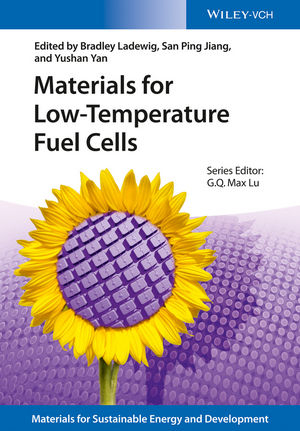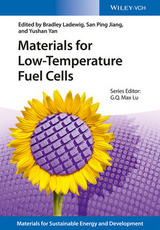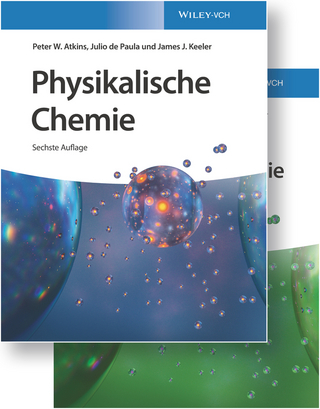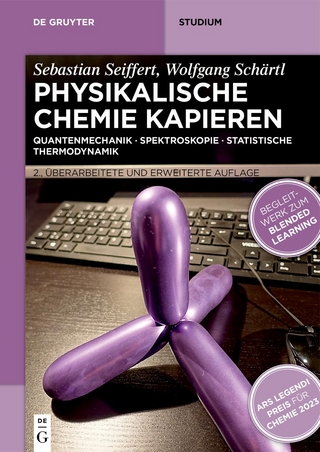Materials for Low-Temperature Fuel Cells
Wiley-VCH (Verlag)
978-3-527-33042-3 (ISBN)
- Titel ist leider vergriffen;
keine Neuauflage - Artikel merken
Associate Professor Bradley Ladewig is an academic in the Department of Chemical Engineering at Monash University, Australia, where he leads a research group developing membrane materials and technologies for clean energy applications. He has a wide range of experience as a chemical engineering researcher, including in membrane development for direct methanol fuel cells, testing and modeling of combined heat and power PEM fuel cell systems, and desalination membrane development. Recently he has worked on several collaborative projects in the field of direct carbon fuel cells, metal organic framework materials as gas sorbents and membrane components, and low-cost microfluidic sensors based on paper and thread substrates. He is a Fellow of the Institution of Chemical Engineers. Professor San Ping Jiang is a professor at the Department of Chemical Engineering, the Deputy Director of Fuels and Energy Technology Institute, Curtin University, Australia and Adjunct Professor of the University of the Sunshine Coast, Australia. He also holds Visiting/ Guest Professorships at the Southwest University, Central South University, Harbin Institute of Technology, Guangzhou University, Huazhong University of Science and Technology, Wuhan University of Technology, University of Science and Technology of China (USTC), Sichung University, and Shandong University. Dr. Jiang has broad experience in both academia and industry, having held positions at Nanyang Technological University, the CSIRO Manufacturing Science and Technology Division in Australia, and Ceramic Fuel Cells Ltd (CFCL). His research interests encompass solid oxide fuel cells, proton exchange and direct methanol fuel cells, direct alcohol fuel cells, and electrolysis. With an h-index of 50, he has published over 270 journal papers, which have accrued ~8,500 citations Professor Yushan Yan is Distinguished Engineering Professor in the Department of Chemical and Biomolecular Engineering at the University of Delaware. His previous positions include Presidential Chair, University Scholar, and Department Chair at the University of California Riverside and Senior Staff Engineer at AlliedSignal Inc. He was instrumental to the formation of technology startups such as NanoH2O, Full Cycle Energy, Zeolite Solution Materials, and OH-Energy. His research focuses on zeolite thin films and electrochemical devices including fuel cells, electrolyzers, solar hydrogen and redox flow batteries. He has published 160+journal papers and has a h-index of 52. He was recognized by the Donald Breck Award from the International Zeolite Association and is a Fellow of the American Association for the Advancement of Science.
KEY MATERIALS FOR LOW-TEMPERATURE FUEL CELLS: AN INTRODUCTION
ALKALINE ANION EXCHANGE MEMBRANE FUEL CELLS
Fuel Cells
PEM Fuel Cell Principles
Alkaline Fuel Cells
Summary
CATALYST SUPPORT MATERIALS FOR PROTON EXCHANGE MEMBRANE FUEL CELLS
Introduction
Current Status of Support Materials and Role of Carbon as Support in Fuel Cells
Novel Carbon Materials as Electrocatalyst Support for Fuel Cells
Conductive Metal Oxide as Support Materials
Metal Carbides and Metal Nitrides as Catalyst Supports
Conducting Polymer as Support Materials for Fuel Cells
Conducting Polymer-Grafted Carbon Materials
3M Nanostructured Thin Film as Support Materials for Fuel Cells
Summary and Outlook
ANODE CATALYSTS FOR LOW-TEMPERATURE DIRECT ALCOHOL FUEL CELLS
Introduction
Anode Catalysts for Direct Methanol Fuel Cells: Improved Performance of Binary and Ternary Catalysts
Anode Catalysts for Direct Ethanol Fuel Cells: Break C-C Bond to Achieve Complete 12-Electron-Transfer Oxidation
Anode Catalysts for Direct Polyol Fuel Cells (Ethylene Glycol, Glycerol): Cogenerate Electricity and Valuable Chemicals Based on Anion Exchange Membrane Platform
Synthetic Methods of Metal Electrocatalysts
Carbon Nanomaterials as Anode Catalyst Support
Future Challenges and Opportunities
MEMBRANES FOR DIRECT METHANOL FUEL CELLS
Introduction
Basic Principles of Direct Methanol Fuel Cell Operation
Membranes for Direct Methanol Fuel Cells
Membrane Properties Summary
Conclusions
HYDROXIDE EXCHANGE MEMBRANES AND IONOMERS
Introduction
Requirements
Fabrications and Categories
Structure and Properties of Cationic Functional Group
Structure and Properties of Polymer Main Chain
Structure and Properties of Chemical Cross-Linking
Prospective
MATERIALS FOR MICROBIAL FUEL CELLS
Introduction
MFC Configuration
Anode Materials
Cathode
Separators
Outlook
BIOELECTROCHEMICAL SYSTEMS
Bioelectrochemical Systems and Bioelectrocatalysis
On the Nature of Microbial Bioelectrocatalysis
Microbial Electron Transfer Mechanisms
From Physiology to Technology: Microbial Bioelectrochemical Systems
Applicatin Potential of BES Technology
Characterization of BESs and Microbial Bioelectrocatalysts
Conclusions
MATERIALS FOR MICROFLUIDIC FUEL CELLS
Introduction
Fundamentals
Membraneless LFFC Designs and the Materials in Use
Fuel, Oxidant, and Electrolytes
Conclusions
PROGRESS IN ELECTROCATALYSTS FOR DIRECT ALCOHOL FUEL CELLS
Introduction
Developing an Effective Method to Prepare Electrocatalysts
Electrocatalysts for ORR
Electrocatalysts for MOR
Electrocatalysts for Ethanol Electrooxidation
Conclusions
Index
| Erscheint lt. Verlag | 28.1.2015 |
|---|---|
| Reihe/Serie | Materials for Sustainable Energy and Development |
| Mitarbeit |
Herausgeber (Serie): G. Q. Max Lu |
| Verlagsort | Weinheim |
| Sprache | englisch |
| Maße | 170 x 244 mm |
| Gewicht | 745 g |
| Themenwelt | Naturwissenschaften ► Chemie ► Physikalische Chemie |
| Technik ► Elektrotechnik / Energietechnik | |
| Technik ► Maschinenbau | |
| Schlagworte | Batterien u. Brennstoffzellen • Batteries & Fuel Cells • Batteries & Fuel Cells • Brennstoffzelle • Brennstoffzellen • Chemie • Chemistry • Energie • Energy • Hydrogen, Batteries & Fuel Cells • Hydrogen, Batteries & Fuel Cells • Materialien f. Energiesysteme • Materials for Energy Systems • Materials Science • Materialwissenschaften • Nachhaltige u. Grüne Chemie • Nanomaterialien • nanomaterials • Nanotechnologie • nanotechnology • Sustainable Chemistry & Green Chemistry • Sustainable Chemistry & Green Chemistry • Wasserstoff, Batterien u. Brennstoffzellen |
| ISBN-10 | 3-527-33042-9 / 3527330429 |
| ISBN-13 | 978-3-527-33042-3 / 9783527330423 |
| Zustand | Neuware |
| Haben Sie eine Frage zum Produkt? |
aus dem Bereich




